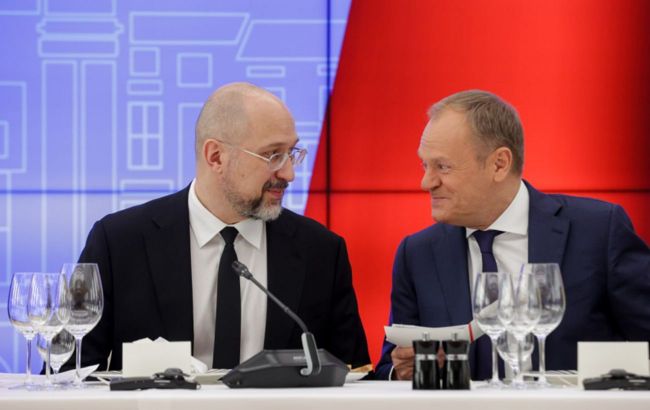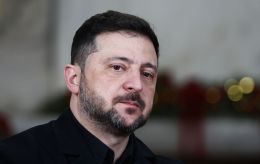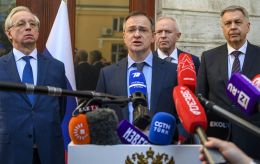Prime Ministers of Poland and Ukraine signed joint statement during negotiations in Warsaw
 Photo: Prime Ministers of Ukraine and Poland Denys Shmyhal and Donald Tusk (kmu.gov.ua)
Photo: Prime Ministers of Ukraine and Poland Denys Shmyhal and Donald Tusk (kmu.gov.ua)
Following the meeting of government delegations of Ukraine and Poland in Warsaw on March 28, where discussions on the border situation and trade took place, the parties signed a joint statement. The next round of such consultations is scheduled to take place next year in Kyiv, according to Government Portal.
The Ukrainian delegation was led by Prime Minister Denys Shmyhal, while his Polish counterpart was Donald Tusk.
As emphasized by the head of the Ukrainian government, the countries are strategic allies. He also noted the importance of a clear understanding of "how significant mutual support and the potential of our cooperation are."
According to Shmyhal, the government teams of both countries discussed a range of issues of mutual interest in cooperation.
The government press service indicates that during the negotiations, particular attention was paid to such complex topics as the border situation and trade in the agricultural sector, and the direction for resolving these issues was determined.
"We expect concrete responses from Poland to the steps we have proposed. Most of them have already been implemented. We expect the European Commission to ban the transit and export of goods from Russia and Belarus, as well as to approve our agreement on joint control at checkpoints," stated Shmyhal.
What was specifically agreed upon in the negotiations
Following the intergovernmental consultations, a joint statement was adopted. The text of the statement is provided below.
On March 28, 2024, the Polish-Ukrainian Intergovernmental Consultations were held in Warsaw, upon the outcomes of which the Parties:
noted the special partnership linking the Republic of Poland and Ukraine, as well as the solidarity and centuries-old ties between the Polish and Ukrainian peoples;
reaffirmed the unwavering support of the Republic of Poland for the Forces of Defence of Ukraine in repelling the illegal, unjustified and unprovoked war of aggression of the Russian Federation against Ukraine, which has violated the foundations of the rules-based international order;
stressed the unwavering support of the Republic of Poland for the restoration of the sovereignty and territorial integrity of Ukraine within its internationally recognized borders set in 1991;
expressed full support of the Republic of Poland for the Peace Formula of the President of Ukraine Volodymyr Zelenskyy, emphasized the importance of implementation of this initiative to achieve a comprehensive, just and lasting peace in Ukraine, and supported the organisation of the Global Peace Summit;
agreed that the Russian Federation should bear the legal consequences of its crime of aggression, whereas Russian leaders and perpetrators will be held accountable for committed international crimes including the crime of aggression and violations of the international humanitarian law;
called on the international community to further provide Ukraine with all necessary military assistance required to resist the armed aggression and to defeat Russia, urgently proceed with using frozen Russian assets for the purposes of Ukraine’s defence and reconstruction as well as to increase sanctions’ pressure on the Russian Federation;
confirmed their continued efforts to put in place effective measures to block imports of agricultural products from Russia and Belarus to the EU market as a necessary tool to remove pressure on the EU agricultural markets;
reaffirmed their readiness to actively cooperate in the process of reconstruction of Ukraine;
stressed that accession of Ukraine to the EU and NATO is in the vital interest of both countries, with an understanding that Ukraine's security is integral to European security;
launched the bilateral dialogue on European integration to be developed in the form of regular working sectoral consultations between relevant interested ministries, in order to contribute into strengthening of the institutional preparedness of Ukraine for the EU accession negotiations and to facilitate and support Ukraine’s gradual integration into the EU internal market;
confirmed that trade liberalisation measures should be shaped in such a way as to have a positive impact on the economies of the Republic of Poland and other EU Member States as well as Ukraine without destabilising their markets, and that the mechanisms jointly developed should give control over the stability of the trade, taking into account the changing security situation in Ukraine;
took note of the successful efforts Ukraine has taken to unblock the Black Sea Corridor;
exchanged views on the progress of Ukraine’s EU accession process and the instruments of support of the Republic of Poland to the Ukrainian administration in preparing for accession negotiations;
agreed that the Republic of Poland will work towards the convening of the First Intergovernmental Conference between the EU and Ukraine, no later than June 2024;
took note of the decision of the NATO-Ukraine Council of February 15, 2024 to establish a new NATO-Ukraine Joint Centre for Analysis, Training and Education in Bydgoszcz;
took note of the decision of the Republic of Poland to join the G7 initiative on security arrangements with Ukraine, with a view to its prompt conclusion;
summarized the discussions and commitments undertaken by the Parties during the 9 meeting of the Polish-Ukrainian Intergovernmental Commission on Economic Cooperation, held in Lviv on March 11, 2024, and discussed current challenges on economic cooperation, investment and trade issues;
agreed to amend the Intergovernmental Agreement dated September 9, 2015, to extend the term of the contracts payment by 8 years, in order to continue the contracts’ execution and to increase the volume and the quality of crossing of the Polish-Ukrainian state border;
recognized that trade should be balanced and mutually beneficial for agricultural producers in the Republic of Poland and Ukraine;
stressed that both Parties have already undertaken many efforts to establish fair rules for agri-food trade between the Republic of Poland and Ukraine and that further effective dialogue based on mutual understanding is needed;
agreed to take further steps in the search for mutually satisfactory solutions, such as a verification and control system, for trade in agri-food goods; the Ministers responsible for agriculture and trade of both Parties will continue their ongoing cooperation on these issues;
agreed that the Action Plan on Solidarity Lanes had a significant success for maintaining unhindered transit of Ukrainian goods through the European Union in a situation of ongoing full-scale Russian aggression and serious logistical problems;
confirmed their readiness to conclude an Agreement on providing control at joint border checkpoints and cooperation of control bodies, after approving by EU Commission, to launch logistical data exchange at selected road border crossing points, to create and maintain a transport network adequate to the needs, including through the implementation of coordinated infrastructure projects;
underlined that the above-mentioned measures are aimed at ensuring the uninterrupted and smooth functioning of the common state border, which is a key infrastructure for the movement of goods and which ensures connectivity and accessibility of regions between nations;
took note of the challenges existing between the Republic of Poland and Ukraine and declared their willingness to decisively cooperate together to reach mutually satisfactory and long-term solutions;
underlined the need to deepen cooperation in the field of countering crime and agreed on the steps to be taken to sign a new Polish-Ukrainian intergovernmental agreement on cooperation in the fight against crime;
reiterated their interest in further advancing cooperation on energy, developing joint projects and collaborating closely on mutual energy security;
condemned the seizure of the Zaporizhzhia nuclear power plant and ongoing massive targeted attacks on Ukrainian civil energy infrastructure;
confirmed to strengthen cooperation in carrying out searches, exhumations and other activities for the dignified burial of victims of conflicts, repressions and crimes committed on the territories of the Republic of Poland and Ukraine, as well as with regard to requests to the competent authorities of both Parties to carry out such works;
appreciated the comprehensive support of the Republic of Poland, including the legal solutions adopted to ensure temporary protection, provided to Ukrainian citizens who found temporary shelter in the Republic of Poland following the outbreak of Russian aggression;
agreed to intensify cooperation in order to ensure the rights of the Polish and Ukrainian national minorities, as well as to strengthen cooperation in the field of higher education and science;
confirmed their readiness to cooperate in the field of digital transformation;
confirmed their support for Ukraine's membership in the European Space Agency;
expressed their gratitude to the public institutions, associations and all people of good will engaged in enhancing dialogue and understanding in the Polish-Ukrainian relations;
agreed to hold the next meeting of the Polish-Ukrainian intergovernmental consultations in Kyiv in 2025.
Meeting of Shmyhal and Tusk
Today, on March 28th, consultations between the governments of Ukraine and Poland took place in Warsaw. The Ukrainian delegation is led by Prime Minister Denys Shmyhal, while the Polish side is represented by Donald Tusk.
One of the main issues discussed at the meeting was the border blockade. As reported by the Ukrainian Prime Minister, the parties have developed a plan consisting of five steps.
Border blockade
In February, protests at the Polish-Ukrainian border resumed. Farmers have been blocking border crossings, stating that they will continue their protests until the end of April.
However, recently, farmers have unblocked several border crossings with Ukraine. For example, today, the movement of trucks resumed at the Uhryniv-Dołhobyczow checkpoint.
For more details on the compromise, screening, export bans from Russia, and how Ukraine and Poland are addressing border issues, read the material by RBC-Ukraine.

